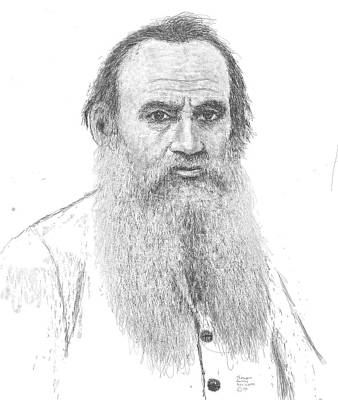Leo Tolstoy Archive
Written: 1888
Source: Translated by Nathan Haskell Dole
Transcription/Markup: Andy Carloff
Online Source: RevoltLib.com; 2021

One Easter a peasant went to see whether the frost was out of the ground.
He went to his vegetable garden and poked into the ground with a stake. The soil was soft.
The peasant went into the forest. In the woods the catkins on a young willow were already beginning to swell. And the peasant said to himself :
" Let me plant young willows around my garden ; they will grow and make a hedge."
He took his ax, cut down a dozen young sprouts, trimmed down the butts into points, and planted them in the ground.
All the willow sticks put forth sprouts and green foliage above ; and below, underground, they sent out similar sprouts in place of roots, and some of them took hold of the earth and strengthened themselves ; but others did not take hold of the earth with their roots, and these died and toppled over.
When autumn came, the peasant was delighted with his willows ; six of them had taken root. The next spring some sheep girdled four of them, and thus only two were left.
The following spring, sheep girdled these also. One died away entirely, but the other took new lease of life, sent down deeper roots, and became a tree. Every spring the bees hummed on in the branches. Oftentimes they would swarm there, and the peasants would gather them into hives.
Peasants and their wives often came to lunch and nap under the tree, and their children climbed up its trunk and broke off its twigs.
. The peasant the one who had set out the slip had died long ago, and still the willow grew.
His eldest son twice trimmed off its branches and used them for fuel.
And still the willow grew. They cut the branches all round and made a cone of it, and when spring came, it still again put forth new branches, though they were small, but twice as many as before, like the mane of a colt.
And the eldest son ceased to be master of the house, and the village was removed to another place, but still the willow grew in the bare field.
Other peasants came and cut it down, and still it grew. The lightning struck the tree ; it sent out fresh branches from the sides, and still it grew and bloomed.
One peasant wanted to cut it down to a block, and actually felled it ; but it was badly rotted. The tree fell over and held only by one side, but still it kept growing, and every year the bees flew to it to gather pollen from its flowers.
Once, early in the spring, the children gathered to- gether to tend the horses under the tree.
They thought that it was rather cold, and they began to make a fire, and they collected stubble, mugwort, and twigs. One boy climbed the willow and broke off branches. They piled all their tinder in the hollow of the willow and set it on fire.
The willow began to hiss ; the sap in its wood boiled, the smoke poured forth, and then it began to blaze ; all the inside turned black. The young sprouts crumpled up ; the blossoms wilted.
The children drove their horses home. The burned willow remained alone in the field. A black crow flew up to it, perched on it, and cried :
" So the old poker is dead ; it was time long ago ! "